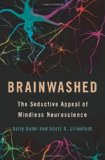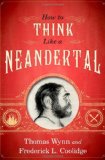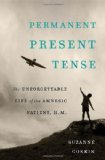May 20, 2013

Brainwashed: The Seductive Appeal of Mindless Neuroscience by Sally Satel and Scott O. Lilienfeld (Basic Books, 2013)
(kindle ed.), (amazon.co.uk)
Book description from the publisher:
What can’t neuroscience tell us about ourselves? Since fMRI—functional magnetic resonance imaging—was introduced in the early 1990s, brain scans have been used to help politicians understand and manipulate voters, determine guilt in court cases, and make sense of everything from musical aptitude to romantic love. But although brain scans and other neurotechnologies have provided groundbreaking insights into the workings of the human brain, the increasingly fashionable idea that they are the most important means of answering the enduring mysteries of psychology is misguided—and potentially dangerous.
In Brainwashed, psychiatrist and AEI scholar Sally Satel and psychologist Scott O. Lilienfeld reveal how many of the real-world applications of human neuroscience gloss over its limitations and intricacies, at times obscuring—rather than clarifying—the myriad factors that shape our behavior and identities. Brain scans, Satel and Lilienfeld show, are useful but often ambiguous representations of a highly complex system. Each region of the brain participates in a host of experiences and interacts with other regions, so seeing one area light up on an fMRI in response to a stimulus doesn’t automatically indicate a particular sensation or capture the higher cognitive functions that come from those interactions. The narrow focus on the brain’s physical processes also assumes that our subjective experiences can be explained away by biology alone. As Satel and Lilienfeld explain, this “neurocentric” view of the mind risks undermining our most deeply held ideas about selfhood, free will, and personal responsibility, putting us at risk of making harmful mistakes, whether in the courtroom, interrogation room, or addiction treatment clinic.
A provocative account of our obsession with neuroscience, Brainwashed brilliantly illuminates what contemporary neuroscience and brain imaging can and cannot tell us about ourselves, providing a much-needed reminder about the many factors that make us who we are.
Comments (0)
- cognitive science,new books
May 17, 2013

The Art of Thinking Clearly by Rolf Dobelli (Harper, 2013)
(kindle ed.), (amazon.co.uk)
Book description from the publisher:
The Art of Thinking Clearly by world-class thinker and entrepreneur Rolf Dobelli is an eye-opening look at human psychology and reasoning — essential reading for anyone who wants to avoid “cognitive errors” and make better choices in all aspects of their lives.
Have you ever: Invested time in something that, with hindsight, just wasn’t worth it? Or continued doing something you knew was bad for you? These are examples of cognitive biases, simple errors we all make in our day-to-day thinking. But by knowing what they are and how to spot them, we can avoid them and make better decisions.
Simple, clear, and always surprising, this indispensable book will change the way you think and transform your decision-making—work, at home, every day. It reveals, in 99 short chapters, the most common errors of judgment, and how to avoid them.
See also: Author’s website
Comments (0)
- cognitive science,new books,psychology
May 16, 2013
Amazon’s Big Deal is on through May 27, featuring over 500 titles at up to 85% off (“Individual books may have additional territory restrictions, and not all deals are available in all territories. Amazon may modify the selection of books offered at any time.”) including:

How To Think Like a Neandertal by Thomas Wynn and Frederick L. Coolidge for $3.99.

Bird Sense: What It’s Like To Be a Bird by Tim Birkhead for $2.99.

Your Brain on Food: How Chemicals Control Your Thoughts and Feelings by Gary L. Wenk for $3.99.
Or, browse, the whole Nonfiction list…
Comments (0)
- Uncategorized
May 14, 2013

Permanent Present Tense: The Unforgettable Life of the Amnesic Patient, H. M. by Suzanne Corkin (Basic Books, 2013)
(kindle ed.), (amazon.co.uk)
Book description from the publisher:
In 1953, 27-year-old Henry Gustave Molaison underwent an experimental “psychosurgical” procedure—a targeted lobotomy—in an effort to alleviate his debilitating epilepsy. The outcome was unexpected—when Henry awoke, he could no longer form new memories, and for the rest of his life would be trapped in the moment.
But Henry’s tragedy would prove a gift to humanity. As renowned neuroscientist Suzanne Corkin explains in Permanent Present Tense, she and her colleagues brought to light the sharp contrast between Henry’s crippling memory impairment and his preserved intellect. This new insight that the capacity for remembering is housed in a specific brain area revolutionized the science of memory. The case of Henry—known only by his initials H. M. until his death in 2008—stands as one of the most consequential and widely referenced in the spiraling field of neuroscience. Corkin and her collaborators worked closely with Henry for nearly fifty years, and in Permanent Present Tense she tells the incredible story of the life and legacy of this intelligent, quiet, and remarkably good-humored man. Henry never remembered Corkin from one meeting to the next and had only a dim conception of the importance of the work they were doing together, yet he was consistently happy to see her and always willing to participate in her research. His case afforded untold advances in the study of memory, including the discovery that even profound amnesia spares some kinds of learning, and that different memory processes are localized to separate circuits in the human brain. Henry taught us that learning can occur without conscious awareness, that short-term and long-term memory are distinct capacities, and that the effects of aging-related disease are detectable in an already damaged brain.
Undergirded by rich details about the functions of the human brain, Permanent Present Tense pulls back the curtain on the man whose misfortune propelled a half-century of exciting research. With great clarity, sensitivity, and grace, Corkin brings readers to the cutting edge of neuroscience in this deeply felt elegy for her patient and friend.
See also: Book website
Comments (0)
- cognitive science,new books








